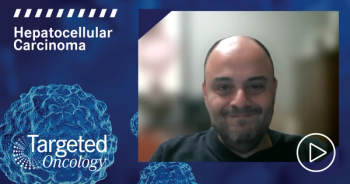
Unresectable HCC: Considerations for Resection and Frontline Therapy
Catherine Frenette, MD:The initial treatments that we think about for liver cancer are curative treatments, which would be resection, transplant, or potential ablation in the small tumors less than 2 cm. When we think about the eligibility for resection, the big thing to consider is the underlying disease and whether the liver with cirrhosis is going to be able to tolerate a resection. That has to do with the liver function as well as portal hypertension, as well as how much of the liver will need to be resected and the volume of remnant. This patient is not a candidate because he has metastatic disease. If he did not have metastatic disease, we could potentially look at whether he would have portal hypertension, an elevation of his bilirubin, the location of the tumor, and whether resection would be an option.
For transplantation we need to see if they are within the Milan criteria: the initial liver cancer rules that we use to follow transplantation. These criteria state that the tumor must be up to 5 cm, or 3 tumors, or fewer than 3 cm without vascular invasion or extrahepatic spread. Because he has extrahepatic spread, he is not a candidate for transplant. He has only one 4.5-cm tumor, so if he did not have the extrahepatic setting, he could potentially have been a candidate. We’ll also take patients who don’t have metastatic disease or extrahepatic spread, but they’re outside the Milan criteria. We’ll treat them to try what we call “downstaging,” to bring them within the Milan criteria, by shrinking, ablating, or TACEing [transarterial chemoembolization] the tumors.
Multidisciplinary teams are important with the management of liver cancer. We’re taking care of a cancer, but we also are taking care of underlying liver disease. We have to involve our surgeons, radiologists, and radiation oncologists to determine resectability or transplantability. It’s important to interact with all of these different specialists. The best way to do this is to have a multidisciplinary tumor board every week that considers the cases as a group. Any initial treatment that we have for a new presentation or recurrence, is brought to our multidisciplinary tumor board. The data have shown that patients who are offered multidisciplinary approaches have a better overall survival, availability of treatment, and response to therapies.
When we’re thinking about frontline treatment for metastatic liver cancer, we have several systemic treatments available. Many would consider doing a local regional therapy with some systemic treatment, but given the patients’ lack of disease in the liver and metastases, systemic treatment with some kind of oral chemotherapy is the way to go. Our options include lenvatinib [Lenvima] or sorafenib [Nexavar]. Immunotherapy [I-O] may be an option in the future, but right now it’s approved for only second-line treatment. Lenvatinib is a good option for this patient because he’s symptomatic; it has a better response rate, meaning the tumor has a better likelihood of shrinking in these patients. For those patients who present to me with symptoms such as pain or discomfort in the abdomen, I try to offer them lenvatinib as a front-line treatment because of these effects.
Transcript edited for clarity.
A 77-Year-Old Male With Unresectable HCC and Extrahepatic Involvement
- History and physical exam
- An otherwise healthy, 77-year-old Caucasian male with a history of alcohol use
- Presented to his PCP complaining of abdominal pain, fatigue and an unexplained 10-lb weight loss
- Currently consumes 3-4 alcoholic drinks per day
- ECOG PS 0
- Imaging
- CT scan: 4.5-cm hepatic lesion with arterial hypervascularity, portal venous washout, and a pseudocapsule indicative of hepatocellular carcinoma; no evidence of vascular invasion
- Bone scan: left-sided iliac mass (3.1 cm)
- Chest CT: clear
- Diagnosis: unresectable HCC with extrahepatic involvement
- BCLC stage C
- Child-Pugh A
- AFP Level: 3548.4 ng/mL
- Weight: 72 kg
- Lenvatinib 12 mg QD was initiated.
- He experienced modest weight loss and reported loss of appetite for which he was referred for nutritional therapy
- Imaging at 16 weeks: partial response (0.5 cm)
- 8 months after initiation of therapy: treatment discontinued due to disease progression




















